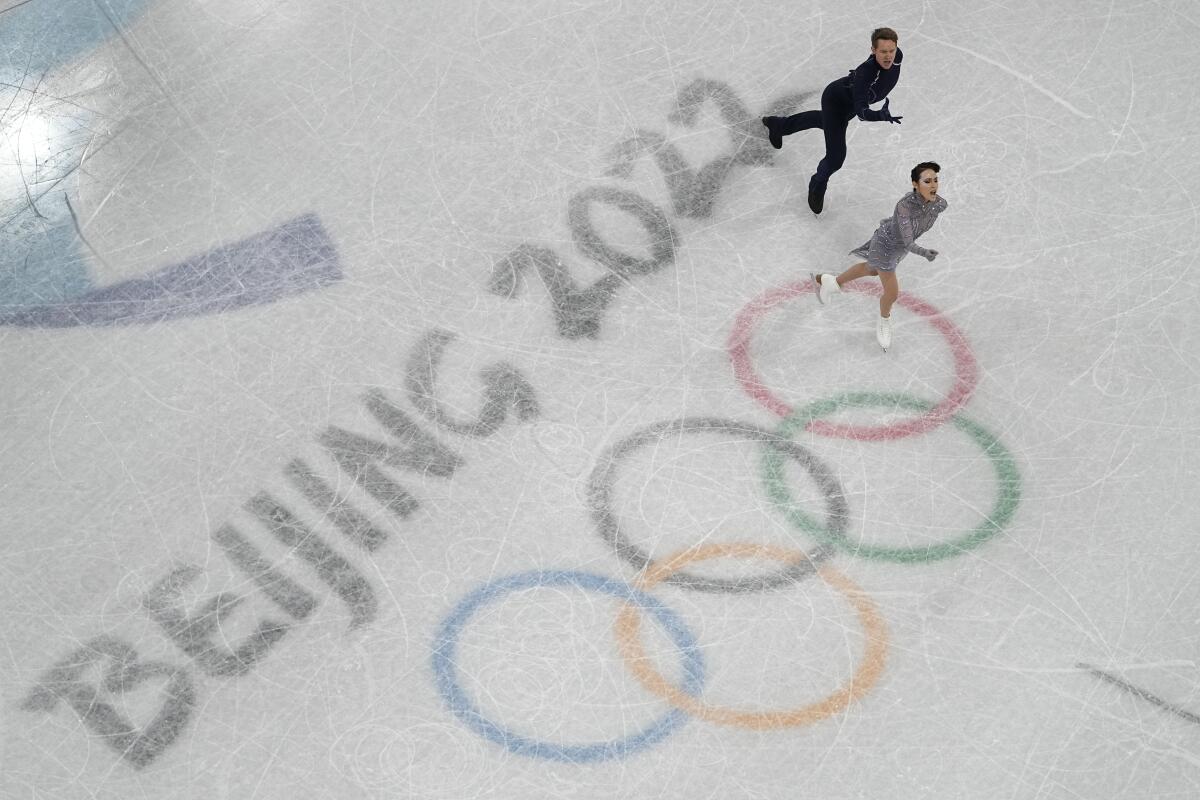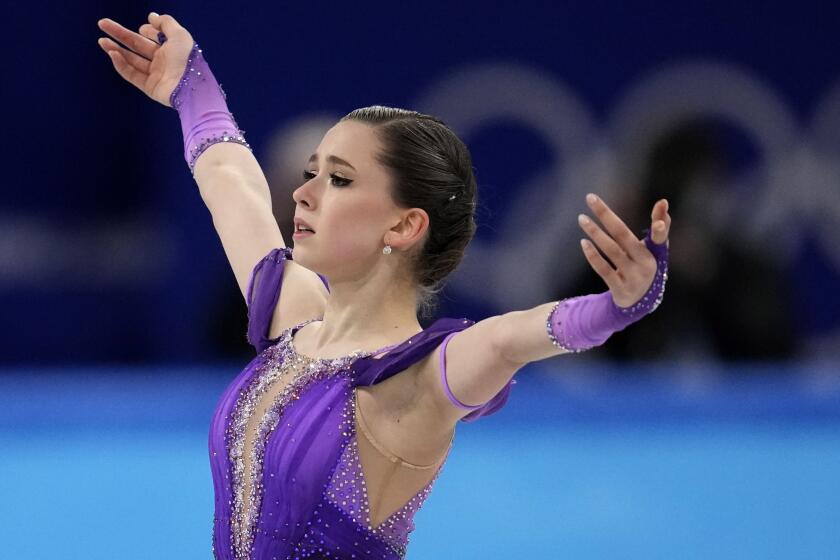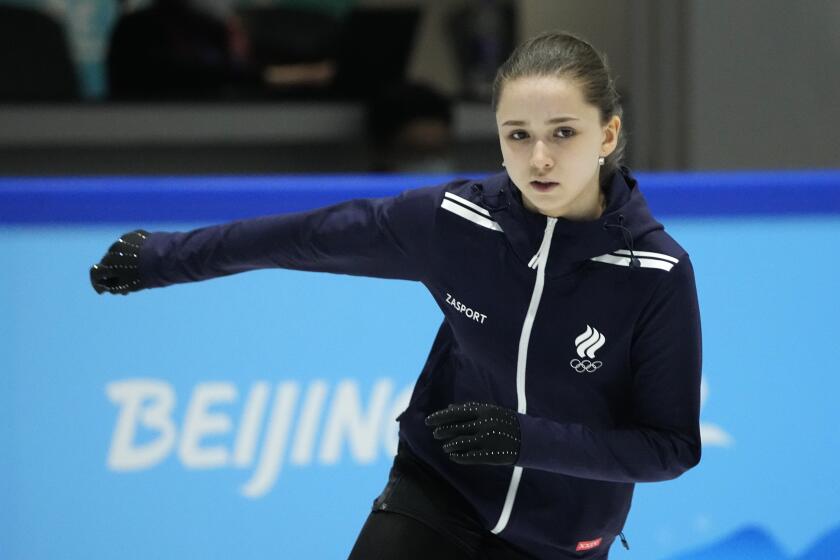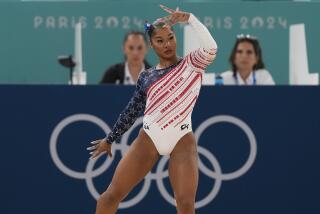Column: In wake of Kamila Valieva’s disqualification, delayed justice for U.S. figure skaters

Their golden moment is gone, never to be enjoyed as it should have been, on the ice where nine American figure skaters were robbed of a gold medal in the Beijing Olympics team competition because of the doping-fueled performance of Russian teenager Kamila Valieva.
But after nearly two years of plodding investigations and more than a few anxious moments, justice for the U.S. skaters, though delayed, has not been denied. A decision rendered Monday by the Switzerland-based Court of Arbitration for Sports confirmed Valieva had committed an anti-doping violation and as a result erased her results at the Olympics and other events from Dec. 25, 2021 onward, suspending her for four years from that date. Based on that ruling, the International Skating Union said Tuesday the U.S. team would be elevated from silver medalists to gold.
No matter where or when their medal ceremony takes place, it won’t have the same immediacy for the Americans as if they had climbed to the top step of the medal stand in Beijing in view of a global audience of millions and were able to proudly wear their medals around the athletes’ village. But it will prove a point beyond affirming the skill of their skating.
It will, ice dancer Evan Bates believes, celebrate a larger principle: that efforts to punish doping are essential to the integrity of sports, no matter the patience, persistence, and vigilance that fight requires.
U.S. Olympic figure skaters who competed at the 2022 Beijing Olympics will receive gold medals in the wake of Kamila Valieva’s disqualification.
“Through this entire saga, I think focusing on the positivity that this has been a victory for clean sport, albeit it was a difficult and arduous wait, I think we feel very grateful that this case has had due process and has reached this conclusion here. Maybe not a conclusion, but this finding,” Bates said Tuesday during a conference call with reporters.
“And I think there are so many clean athletes who historically have not had their moment, have not had the recognition they deserved, whether that’s because those doping didn’t get caught or the case didn’t come to trial. Or what have you. There are countless athletes in history, through the decades, that have not had the moment that we have just now had. So we’re extremely happy. We’re extremely pleased. And we’re just really focusing on that and celebrating achievement.”
The decision by CAS can be appealed to the Swiss Federal Tribunal on procedural grounds. Japan was elevated from third to silver-medal status, but there still are questions about whether the Russian team, ranked third after the disqualification of Valieva’s scores, will get a bronze medal over fourth-place Canada. The medals were withheld in Beijing, not awarded because of investigations triggered by the disclosure of Valieva’s positive doping test at the Russian championships.
Valieva, then 15, was almost certainly manipulated by the adults around her into taking the prohibited substance trimetazidine, which is used to treat heart conditions and helps the efficiency of blood flow. They wanted the reflected glory of her success but instead turned her into a cautionary tale. Her coaches and federation jeopardized her health and her career. She’s a tragic figure in many ways.
What’s certain after all of this is that the nine Americans will be golden. The team was composed of singles skaters Nathan Chen, Vincent Zhou, and Karen Chen; pairs skaters Alexa Knierim and Brandon Frazier, and the ice dance duos of Madison Hubbell and Zachary Donohue and Madison Chock and Bates. Of that group, only Chock and Bates are still actively competing, having won their fifth U.S. title last weekend.
“There is no scenario at this point in which Team USA is not the gold-medal winners,” said Sarah Hirshland, chief executive and president of the U.S. Olympic and Paralympic Committee.
“We have a high degree of confidence and I have been given very clear direction that we should proceed in awarding gold medals to the United States team, and that’s what we’re going to do.”
Hirshland said the new top three teams could be united in one place to be awarded their medals, but she’s not bound by that and is focusing on properly honoring the American skaters. Holding a three-team ceremony would be awkward and unnecessarily bring back memories of Valieva’s joy-sapping cheating.
Despite evidence that Kamila Valieva tested positive for a banned substance Dec. 25, the figure skating sensation, 15, will be allowed to compete at the Olympics.
Chock, who’s from Redondo Beach, acknowledged she had “a small, underlying feeling of maybe a little bit of sadness and disappointment that we didn’t get that Olympic moment,” a weight that vanished when the ruling was announced. Over the last two years, she and her teammates often envisioned their version of the long-delayed ceremony.
“When all of this initially happened, the first thing that came to everyone’s mind was we would love to have a true Olympic medal ceremony, and so for us, that would be a medal ceremony at the Paris Games this summer,” she said. “That would be the dream ceremony. To be able to stand atop a podium at an Olympic event and be there with our families and just to celebrate and be surrounded by the Olympic spirit and the Olympic movement would be our dream scenario.”
Hirshland said she’s “putting champagne on ice” for that occasion in Paris. Bates doesn’t need champagne to celebrate. “I just want to be standing there with all nine of us on the top spot on the podium with the hand over the heart, singing the national anthem,” he said, “and I just can’t wait for that moment to arrive.”
Delayed, but not denied, and that’s what matters.
More to Read
Go beyond the scoreboard
Get the latest on L.A.'s teams in the daily Sports Report newsletter.
You may occasionally receive promotional content from the Los Angeles Times.









